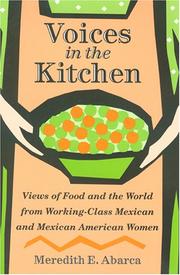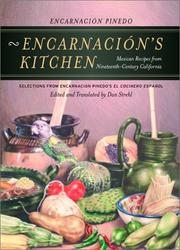| Listing 1 - 8 of 8 |
Sort by
|
Book
ISBN: 1283924374 1574414860 9781574414868 Year: 2006 Publisher: Denton University of North Texas Press
Abstract | Keywords | Export | Availability | Bookmark
 Loading...
Loading...Choose an application
- Reference Manager
- EndNote
- RefWorks (Direct export to RefWorks)
Did you know that Pre-Columbian Mexican cuisine was low in fat and high in fiber and vitamins? Based on corn, squash, tomatoes, beans, and lean meats, the everyday diet of the first Americans was remarkably close to the recommendations for healthy eating we hear about every day. Now for the first time, cooks can use the secrets of the Aztecs in today's kitchen, thanks to Kris Rudolph's thoroughly researched cookbook. The fifty recipes cover everything from appetizers to after-dinner refreshers, such as Roasted Garlic Soup with Spinach and Chicken, Shrimp Ceviche Salad, Chicken Poblano, Beef with Chile Pasilla Sauce, Shrimp Salad-Stuffed Poblano Chiles, and Mango Mousse. Each includes the number of calories, amounts of total fat and saturated fat, grams of carbohydrates, and amount of fiber. Rudolph suggests low-fat and low-carbohydrate alternatives, as well as ways to vary the spiciness. Finally, because cooks from both sides of the border will be eager to try these recipes, this e-book is fully bilingual with English and Spanish sections.

ISBN: 1299137903 1603445633 9781603445634 9781585444779 1585444774 9781585445318 1585444774 1585445312 Year: 2006 Publisher: College Station Texas A & M University Press
Abstract | Keywords | Export | Availability | Bookmark
 Loading...
Loading...Choose an application
- Reference Manager
- EndNote
- RefWorks (Direct export to RefWorks)
Through the ages and across cultures, cooking has allowed women to express themselves and create a world of shared meanings with one another. Through a series of charlas culinarias (culinary chats), the women interviewed in Voices in the Kitchen share their lives as they share their savory, symbolic, and theoretical meanings of food.
Book
ISBN: 1280496525 9786613591753 0857453343 Year: 2012 Publisher: New York : Berghahn Books,
Abstract | Keywords | Export | Availability | Bookmark
 Loading...
Loading...Choose an application
- Reference Manager
- EndNote
- RefWorks (Direct export to RefWorks)
The state of Yucatán has its own distinct culinary tradition, and local people are constantly thinking and talking about food. They use it as a vehicle for social relations but also to distinguish themselves from ""Mexicans."" This book examines the politics surrounding regional cuisine, as the author argues that Yucatecan gastronomy has been created and promoted in an effort to affirm the identity of a regional people and to oppose the hegemonic force of central Mexican cultural icons and forms. In particular, Yucatecan gastronomy counters the homogenizing drive of a national cuisine based on
Food habits --- Food preferences --- Cooking, Mexican --- Yucatán (Mexico : State) --- Social life and customs.
Book
ISBN: 1282727133 9786612727139 9042030453 9789042030459 9789042030442 9042030445 Year: 2010 Publisher: Amsterdam New York, NY Rodopi
Abstract | Keywords | Export | Availability | Bookmark
 Loading...
Loading...Choose an application
- Reference Manager
- EndNote
- RefWorks (Direct export to RefWorks)
Saberes y sabores en México y el Caribe es fruto del proyecto de investigación “Los contextos culinarios en la literatura del Caribe hispano y de México del siglo XVI al siglo XX”. Presenta un análisis de textos de diferentes épocas desde un enfoque gastrocrítico en estas dos áreas. Catorce especialistas comentan las múltiples connotaciones de las referencias culinarias en autores como Bernal Díaz del Castillo, Sor Juana, José Tomás de Cuéllar, Martín Luis Guzmán, Sandra Cisneros, Sara Sefchovich, para la parte dedicada a México. Pedro Mártir de Anglería, Fredrika Bremer, Leonardo Padura Fuentes, Edgardo Rodríguez Juliá, Nancy Alonso, son algunos de los escritores estudiados para la cuenca caribeña. Las contribuciones son de la mano de Adolfo Castañón, Kim Huyge, Eugenia Houvenaghel, Catherine Raffi-Beroud, Carmen de Mora, Diana Castilleja, An Van Hecke, José Guerrero, Rita De Maeseneer, Efraín Barradas, René Vázquez Díaz, Elzbieta Sklodowska, Jacques Joset, Patrick Collard. La edición demuestra la riqueza interpretativa de lo que Alejo Carpentier llamaba los contextos culinarios.
Gastronomy --- Food in literature. --- Cooking in literature. --- Cooking, Mexican --- Cooking, Caribbean --- History. --- Caribbean Area. --- Mexico.
Book
ISBN: 6076284404 Year: 1988 Publisher: El Colegio de México
Abstract | Keywords | Export | Availability | Bookmark
 Loading...
Loading...Choose an application
- Reference Manager
- EndNote
- RefWorks (Direct export to RefWorks)
El sector de comida preparada cobija distintas formas de producción que satisfacen las necesidades alimentarias de cualquier grupo social que ambula por la gran capital del país. En este eslabón de la cadena alimentaria hay empresas cuya actividad sirve para generar, apropiar y acumular capital y otras que obtienen un excedente monetario que alcanza sólo para subsistir. Incluso en algunos casos prevalece una simbiosis en la dinámica misma de la organización productiva de las empresas, donde elementos del sector "tradicional" o de subsistencia se traslapan con elementos capitalistas.
Restaurants --- Cooking, Mexican. --- Cookery, Mexican --- Mexican cooking --- Cafés --- Dining establishments --- Restaurants, lunch rooms, etc. --- Food service --- Happy hours --- Restaurants. --- BUSINESS & ECONOMICS --- Industries --- Food Industry. --- Mexico. --- Business economics --- Economics --- Industrial management --- Management --- Microeconomics --- Anáhuac --- Estados Unidos Mexicanos --- Maxico --- Méjico --- Mekishiko --- Meḳsiḳe --- Meksiko --- Meksyk --- Messico --- Mexique (Country) --- República Mexicana --- Stany Zjednoczone Meksyku --- United Mexican States --- United States of Mexico --- מקסיקו --- メキシコ --- Asian history

ISBN: 128235826X 9786612358265 0520939336 1597345954 9780520939332 1417522844 9781417522842 0520236513 9780520236516 Year: 2003 Publisher: Berkeley University of California Press
Abstract | Keywords | Export | Availability | Bookmark
 Loading...
Loading...Choose an application
- Reference Manager
- EndNote
- RefWorks (Direct export to RefWorks)
In 1991 Ruth Reichl, then a Los Angeles Times food writer, observed that much of the style now identified with California cuisine, and with nouvelle cuisine du Mexique, was practiced by Encarnación Pinedo a century earlier. A landmark of American cuisine first published in 1898 as El cocinero español (The Spanish Cook), Encarnación's Kitchen is the first cookbook written by a Hispanic in the United States, as well as the first recording of Californio food-Mexican cuisine prepared by the Spanish-speaking peoples born in California. Pinedo's cookbook offers a fascinating look into the kitchens of a long-ago culture that continues to exert its influence today. Of some three hundred of Pinedo's recipes included here-a mixture of Basque, Spanish, and Mexican-many are variations on traditional dishes, such as chilaquiles, chiles rellenos, and salsa (for which the cook provides fifteen versions). Whether describing how to prepare cod or ham and eggs (a typical Anglo dish labeled "huevos hipócritas"), Pinedo was imparting invaluable lessons in culinary history and Latino culture along with her piquant directions. In addition to his lively, clear translation, Dan Strehl offers a remarkable view of Pinedo's family history and of the material and literary culture of early California cooking. Prize-winning journalist Victor Valle puts Pinedo's work into the context of Hispanic women's testimonios of the nineteenth century, explaining how the book is a deliberate act of cultural transmission from a traditionally voiceless group.
Cooking, Mexican. --- Cookbooks --- Cooking --- Cookery --- Cuisine --- Food preparation --- Food science --- Home economics --- Dinners and dining --- Food --- Gastronomy --- Table --- Cook-books --- Recipe books --- Books --- Cookery, Mexican --- Mexican cooking --- 19th century. --- american cuisine. --- americana. --- basque recipes. --- california cuisine. --- california food. --- california. --- cook in the kitchen. --- cookbooks. --- cuisine. --- culinary history. --- encarnacion pinedo. --- food and culture. --- food lovers. --- food writing. --- food. --- foodies. --- hispanic influence. --- historical cookbooks. --- home cooks. --- mexican cuisine. --- mexican food. --- mexican recipes. --- nonfiction. --- past cultures. --- recipe book. --- regional cuisine. --- restaurant settings. --- spanish recipes. --- traditional cooking.
Book
ISBN: 0190655771 0199908486 9780199908486 1299879586 9781299879584 9780199740062 0199740062 9780190655778 Year: 2012 Publisher: Oxford Oxford University Press
Abstract | Keywords | Export | Availability | Bookmark
 Loading...
Loading...Choose an application
- Reference Manager
- EndNote
- RefWorks (Direct export to RefWorks)
Planet Taco examines the historical struggles between globalization and national sovereignty in the creation of "authentic" Mexican food. By telling the stories of the "Chili Queens" of San Antonio and the inventors of the taco shell, it shows how Mexican Americans helped to make Mexican food global.
Cooking, Mexican --- Ethnicity --- Food habits --- Globalization --- Mexican Americans --- Sovereignty --- Tacos --- Stuffed foods (Cooking) --- State sovereignty (International relations) --- International law --- Political science --- Common heritage of mankind (International law) --- International relations --- Self-determination, National --- Chicanos --- Hispanos --- Ethnology --- Global cities --- Globalisation --- Internationalization --- Anti-globalization movement --- Eating --- Food customs --- Foodways --- Human beings --- Habit --- Manners and customs --- Diet --- Nutrition --- Oral habits --- Ethnic identity --- Group identity --- Cultural fusion --- Multiculturalism --- Cultural pluralism --- Cookery, Mexican --- Mexican cooking --- History. --- Social aspects --- Food --- Law and legislation --- Sociology of culture --- Mexico --- culinaire geschiedenis --- cultuursociologie
Book
ISBN: 1283574284 0520954165 9780520954168 9780520261112 0520261119 Year: 2012 Publisher: Berkeley University of California Press
Abstract | Keywords | Export | Availability | Bookmark
 Loading...
Loading...Choose an application
- Reference Manager
- EndNote
- RefWorks (Direct export to RefWorks)
After thirty years of leading culinary tours throughout Mexico, Marilyn Tausend teams up with Mexican chef and regional cooking authority Ricardo Muñoz Zurita to describe how the cultures of many profoundly different peoples combined to produce the unmistakable flavors of Mexican food. Weaving engrossing personal narrative with a broad selection of recipes, the authors show how the culinary heritage of indigenous groups, Europeans, and Africans coalesced into one of the world's most celebrated cuisines.Cooks from a variety of cultures share recipes and stories that provide a glimpse into the preparation of both daily and festive foods. In a Maya village in Yucatán, cochinita de pibil is made with the native peccary instead of pig. In Mexico City, a savory chile poblano is wrapped in puff-pastry. On Oaxaca's coast, families of African heritage share their way of cooking the local seafood. The book includes a range of recipes, from the delectably familiar to the intriguingly unusual.
Cooking, Mexican. --- Cooking. --- Cookery --- Cuisine --- Food preparation --- Food science --- Home economics --- Cookbooks --- Dinners and dining --- Food --- Gastronomy --- Table --- Cookery, Mexican --- Mexican cooking --- american history. --- books for food lovers. --- books for history lovers. --- coffee table books. --- cookbook. --- cooking. --- easy to read. --- educational books. --- engaging. --- european history. --- evolution of food. --- food and wine. --- food cultures. --- food studies. --- foodies. --- gastronomy history. --- gifts for friends. --- gifts for mom. --- history of food. --- home cooks. --- interesting food dishes. --- learning while reading. --- mexican cookbook. --- mexican cuisine. --- mexican culture. --- mexican dishes. --- mexican history. --- politics and food. --- recipes to try during quarantine.
| Listing 1 - 8 of 8 |
Sort by
|

 Search
Search Feedback
Feedback About UniCat
About UniCat  Help
Help News
News